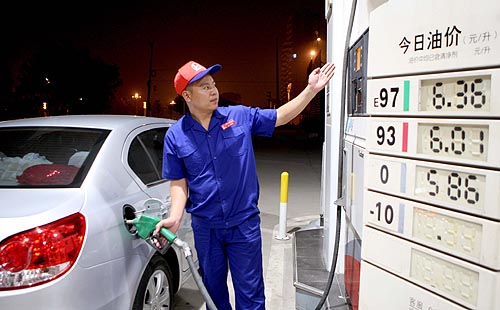|
 |
|
COSTLY OIL: China has on June 30 ordered a price hike on its retail refined oil, the third increase so far this year (CNSPHOTO) |
By ordering a hefty 9-percent price increase in gasoline and diesel, China is lending credibility to its pledges of a more market-oriented pricing system.
The decision, announced by the National Development and Reform Commission (NDRC) on June 30, was the third price hike so far this year following two milder increases in March and May and a price cut in January.
The news came as no surprise to economists, since the government has been edging toward more flexible price adjustments in swift reaction to international market swings.
Under the new pricing regime introduced earlier this year, the NDRC will consider price adjustments when the moving average of international crude oil prices changes more than 4 percent over a period of 22 straight working days. Regulators will also factor in refining and logistics costs, consumers' bearing abilities and the domestic balance of supply and demand, according to an NDRC statement detailing the regime.
In June, average international crude oil prices jumped by around 20 percent to nearly $70 a barrel, making domestic retail prices eligible for adjustment. China is now the world's second largest oil consumer after the United States, and resurgence in its oil consumption is believed to have contributed to the global crude price rally.
The reform was widely believed to be a remarkable break from a more or less rigid pricing scheme to which the government makes irregular and infrequent changes. When inflationary fears picked up in 2007, the price caps helped protect consumers, but at painful expense to refiners who had to pay sky-high prices for crude oil imports while being unable to pass the higher cost onto consumers.
Analysts believe bringing domestic prices more in line with international crude costs will provide a floor under the profitability prospects of domestic refiners. In the face of a margin squeeze, China Petrochemical Corp. (Sinopec), the country's largest crude refiner, had in the last few months repeatedly requested to charge more for diesel and gasoline.
In addition, the new system could encourage energy conservation and help address energy shortages that the country has encountered in recent years when refiners cut back on output to avoid growing losses.
But the continuous price hikes can't be an easy decision for policymakers given the possible damper they put on a number of oil-consuming industries. That explains why the government has relatively reduced the frequency and size of its price adjustments.
"At least it shows the country's lasting persistence in moving toward oil pricing reforms that benefit the national economy in the long run," Zhang Jintao, a senior petrochemical analyst with China International Capital Corp. Ltd., said in a statement. Gathering steam from global economic recovery, international crude prices are likely to come roaring back, he added.
Under the new pricing system, when international prices hover between $80 and $130 a barrel, authorities will sacrifice the refiners' margins to keep domestic prices moderately moving in tandem. But if international prices go above $130 a barrel, regulators will restore caps on domestic prices and subsidize refiners with tax measures.
Analysts point out some flaws in the price-setting formula. Frequent price hikes may easily spark public complaints. More importantly, the formula creates solid expectations of price spiking, giving rise to rampant market speculation. A 22-day lag also gives speculators enough time to hoard fuel, which may disrupt oil distribution across the country.
To step up controls over speculation, the NDRC has subtly left open the possibility of price regulations and has never clarified what variety of international crude prices it is tracking, so its price changes are less predictable.
Wang Songqi, Deputy Director of the Institute of Finance and Banking under the Chinese Academy of Social Sciences, said only a drop in international crude prices can put the new policy to a real test. "Regulators should hang onto the new policy even when international prices go down," he said in an interview with Xinhua News Agency.
Wang Weihan, an economist with the University of International Business and Economics, noted in a report that refiners should also be more transparent with their refining costs so that the new policy can be more rational and acceptable to the public.
It is also imperative for them to strengthen their operational efficiency to the benefit of all consumers, Wang added. | 